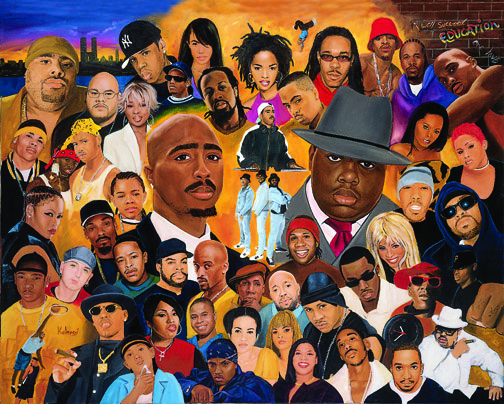On the train home a few weeks ago, I was about to pop on my headphones and listen to Kendrick Lamar when I overheard a conversation between two young white girls discussing their music taste. “I don’t understand how you can listen to rap,” one of the girls said. “All they talk about is money, drugs, and raping women.” Her friend agreed, adding that country music was much better and less controversial—as though the so-called purity of music is intrinsically tied to its artistic value.
I was immediately filled with a sense of indignation: Who were they to denounce an entire genre of music, one that was rooted in the history of Black liberation, one that has been used as a form of protest against oppressive structures since its inception? I knew that this stranger’s take was incredibly ignorant, but I still felt chastened. The next song in my queue was “My Dawg” by 21 Savage & Metro Boomin, where 21 raps about catching snitches and gang murder, among other concepts far removed from my life experience. Despite the murky content, it’s a sonically energizing track that I often reach for. I know music streams provide inadvertent support for these male rappers, but as a woman, how far can that support go without compromising my moral principles?
When I first started seriously listening to harder rap, I was in the midst of a tumultuous emotional period, and sad indie music was not cutting it. Listening to the pugnacious bars of Kodak Black or Skepta empowered me to feel like “that bitch,” ready to embrace an overexaggerated bravado and propel myself forward despite the setbacks thrown my way. These rap and drill tracks provide a taste of what it’s like to walk through the world as a man—and a powerful one, at that.
Rap music puts up an impenetrable barrier of confidence between myself and the world. Blasting gangsta rap through my headphones and hearing the bass pulsate through my core is the closest I come to feeling dangerous, a major deviation from my typical feeling of fear as a woman of short stature. Listening to violent, gritty bars fuels me in a way that no other type of music does—it holds affective power and allows me to feel and channel my rage—an emotion that women are often told is inappropriate. Black women, in particular, are doubly affected as they must navigate the “angry Black woman” stereotype.
This moral dilemma reminds me of the notion of disidentification, a concept proposed by queer theorist José Esteban Muñoz that explains how gender, sexual, and racial minorities can engage with mainstream art forms that are created within a structure of oppression. Choosing to align yourself for or against a cultural product are not the only two options—you can repurpose the art to suit your life and identity. Appreciating culture without endorsing it is possible, and even necessary, for engaging with works as subjective as music.
My love of female rappers, thankfully, does not pose the same moral dilemma. My favourites, like Megan Thee Stallion and Little Simz, are talented artists who rarely bring down other women in their music.
Separately from thematic content, problematic moguls in the rap industry should be held accountable for the harm they cause people, as with any other individual with widespread influence. Rap has its fair share of problematic personas—Chris Brown and Tory Lanez spring to mind—but then again, so does country music, which is rooted in white supremacy and has a serious domestic violence problem. Stereotyping an entire genre of artistry, especially one whose artists are overwhelmingly people of colour, is a narrow-minded cop-out that does not help to dismantle the rampant misogyny within the music industry.
Cultural products are whatever you make them, as music is a deeply personal experience, aurally, and emotionally. Engaging critically with the rap I adore continues to teach me about many different lived perspectives—both those who benefit from the patriarchy and systems of oppression, and those who fall victim to it—all with a chip on my shoulder and a rhythm in my step.










